RB: Dominique, I must tell you, you have a fascinating web site and blog. You have articles on all sorts of fascinating subjects as well as carry many products-I love your web site. Tell us about what you have created.
“Create” is a big word for a small creature. I have created nothing. The smelling plant itself does not create her perfume but she composes it by transforming molecules and by binding already existing atoms that she finds in the air and in the earth, using the energy of the sun.
A natural perfumer is like a deejay assembling together melodies that are the songs of praise that nature sings to its creator. You could also compare the natural perfumer to a writer who narrates novels or writes epics and poesies with the language of smells: Every smell in the nature has a meaning and this meaning speaks to our heart. Never to a writer was it asked what was the last novel or poem he created, but only what he wrote.
We only speak of the latest work of a painter or of a musician. It is not clear to me what has made the people accept the view that Laudaniel creates perfumes while Beethoven composes symphonies and Dostoyevsky writes books.
RB: Please talk to us about your work in olfactory research.
My field of research is olfactory psychology and then obviously its applications into the real world, which are olfactory marketing, psycho aromatherapy, (discovered and expounded by Robert Tisserand), perfumetherapy, (for dysfunctions of the hormonal and nervous system) and at last aromatic psychotherapy.
RB: Please tell us about olfactory psychology. I understand that this is also one a favourite topic.
Perfume is all about psychology. Olfactory research is like the astrophysics of the sense of smell. There do not exist investigating instruments to observe the inner working of the human mind and of his olfactory memories, everything has to be theorized.
Our sense of smell is entirely controlled by our brain. A completely unknown part of it is dedicated to avoid the conflicts between our animal olfactory nature and our human intellectual dimension, conflicts between instinct and intelligence.
Olfactory psychology is about understanding the responses that we show towards different smells. A very amusing experiment is to present different smells under the nose of a new born baby. You will observe the expressions of his face and will discover every emotion in them. He will smile or grin with disgust or anger, you will see curiosity or attraction written on his face. This is showing that from birth we are programmed to answer to odours with determined emotions and behaviours. Understanding the mechanisms that bind our nose and our mind is olfactory psychology.
RB: Tell us about the natural scents, of which you are surrounded with; and in your words “you live immersed”. This is fascinating-
I use to sit with people and we drink tea. I add a drop of ginger essence or a drop of Cardamom in the glasses. The biscuits arrive on the table and I spray them with grapefruit essence. Did you ever try your coke with 2 drops of lemon essence? A stunning experience. Then I say very seriously to my guests, “do not trust a perfumer who does not drink his perfumes".
There is hardly a day in which I do not use an essential oil to heal a child or a friend. The ingredients that a natural perfumer uses are not just smells, they are also “materia medica” in all traditional pharmacopoeias.
No good perfume can be done without some amount of naturals, while very good perfumes can be done without synthetics. In the world of perfumery products such as Jasmine, rose or sandalwood are called “noble”. This is to say their superiority over all others.
People come to me for cures as well as for perfume and the third level of my natural perfumery program is simply my aromatherapy course.
A natural perfumer leaves behind himself a “sillage” like a river, he is in love with perfumes. They are joy to his heart and sanity to his mind. This is how natural perfumers live immersed in natural scents.
RB: I loved your section and article on Ambergris and I understand you have Ambergris tincture available and that they are samples available of raw ambergris.
With Ambergris you are entering the taboo field of animal scents and of natural pheromones. Their names are Castoreum, Civet, Honey bee and Hyraceum, they are still available to modern perfumers but are used very little. These aromatic substances all belong to the traditional pharmacopoeias of the five continents and have been used as perfumes for thousands of years. On the other hands, the existence of pheromones, which is the real nature of animal scents, has been discovered a little more than fifty years ago.
This is all the more surprising that pheromone play a primary role in the reproductive process of all living species.
Our ignorance about the sense of smell is about complete. Studying human pheromones is fascinating for a perfumer because he has can smell pheromone-like molecules in several botanical substances that he works with, like Sandalwood, Black Current, cumin, cocoa, ambrette, vanilla ecc… This is often the reason behind the appeal they have to most people and also behind their reputation as aphrodisiacs.
Like the perfumers of the last century, I myself observed that a perfume containing them is more appealing to the nose our public than the same perfume without them.
Not all my perfume contain animal scents. Perfumes being made for the people, they should have the opportunity to choose, but a fragrance that contains both botanical and animal elements has a different dimension for our olfactory system.
This is what I call “three-dimensional perfumery”. Do you remember the view master of our childhood, it is a binoculars that contains slides, when you look inside it. the images are seen three-dimensional. There are simply two images from a different perspective, every eye sees one of them and our brain perceives three-dimensionality. This is how a three dimensional perfume works, animal and botanical dimensions blend into olfactory three dimensionality.
RB: I also loved the olfactory images from your “Scents of the Soul”. Tell us about that if you please.
I composed most of these fragrances and wrote their texts at the beginning of my way. The “scents of the soul” are shown on the web page by chronologic order, I have not changed a drop to their composition in 20 years.
These texts have been written over years, observing the reactions of thousands of persons to them, they are my first work of olfactory psychology.
I have once been proposed a fortune to give the exclusive of the scents of the soul and of their texts to a businessman who had discovered them. My only answer was, like Bob Marley: “These songs of freedom, are all what I have”. The scents of the soul are all what I have. They are a complete and totally innovative product: perfumes with a meaning. They are my proof for the truth of olfactory psychology.
RB: Please tell us your thoughts about the ethics and philosophy of the profession.
The first things that should be taught to the students who wish to embrace a way are the ethics and the philosophy of the way. The advice of Guerlain to perfumery students sums up the best of ethics in modern perfumery, but to my mind it is only the starting point for a natural perfumer. He said “have simple ideas, apply them scrupulously, never cheat on the quality and make good products”. Our standards of quality are more restrictive than his. He also said “I never “created” a perfume if not for a woman who really existed and if possible who had an importance in my life”.
This is showing how much the first fundamental of my teachings to my students is true: making bespoke perfumes is your school of perfumery and your mission as perfumers.
Real perfumes made for real people, this is my philosophy. Perfumes made with real essences, real rose and real lemon, this is my ethics. Bespoke perfumes are what the people need and this means that the world needs a lot of perfumers. At least as many perfumers as there are doctors, while today there are more presidents in the world than there are perfumers. A revolution has to be made about perfume in our present civilization.
There would be very few musicians in the world if music was not taught at school. Is there anyone around who cannot sing “do re mi fa sol la si do”? We all have received the basis of musical education at school, but olfactory education is totally absent from our culture.
In Japan it has evolved in a mystic teaching, Kodo, the Zen of perfume. In the Hebrew mystic all senses are considered giving pleasure to the body except smell who is designed to give pleasure to the soul. There is a spiritual approach to scents, loving perfumes comes from a quality of the soul and it springs from the search of spiritual joy and of the lost Eden. The spirituality of perfume is deeply anchored in the religious traditions all over the world. But even Kodo is only a starting point for the modern natural perfumers.
From Kodo I have elaborated a program of basic olfactory education for the schools, it is very simple and you may resume it in these words “how to become a perfumer in 3 moves”. Children can make fantastic perfumes indeed, because they are not prejudiced.
Making perfumes is very much like cooking, in fact all perfumers are also cooks. The only reason why the opposite is not true is that all perfumers have pots and pans at home while cooks do not have droppers and essences at hand.
Women do very easily compose perfumes because smells have a major importance in their hormonal equilibrium. I assure you that with the proper raw materials you could easily make very good perfumes. Just like cooking, a simple dish made with just a few ingredients of very good quality can be worthy of the most exclusive restaurant. This is what luca Turin called “simplexity”. But with tasteless tomatoes and old dry onions you could never make a good sauce. I always say to my students, the goodness of your perfumes depends from the goodness of your ingredients.
Making perfume is not the big thing you believe, like in the cooking art, not everybody becomes a chef, but anybody can prepare good dishes. At the beginning, it is only a question of character, the ability to go straight to the point without hesitation and stopping when one is satisfied of the result. As Guerlain said “have simple ideas and apply them scrupulously”.
Only few ingredients are sufficient to make a very good perfume in natural perfumery,
because many of these are so complex that they cover all the levels from top to base notes.
The only problem that faces the natural perfumer is originality, but with bespoke perfumes
we have an endless fount of inspiration from the people for whom we compose our fragrances .
All the people who like perfumes should know that they could easily compose their own
fragrances with natural essences. They could even make perfumes for their friends, and
these would be much better than most of what is found in perfumery shops.
As Anya McCoy said: “Never at any time in history have so many non-French, non-classically-
trained people had access to raw aromatics and the ability to study (often via the internet or
short courses and books.)”
Education is what my site and blog are all about. I am glad that you mentioned liking them
because more than composing perfumes, which is a light and pleasurable thing, my real big work
is indeed this site through which I am proposing to dispense olfactory education and my
philosophy of perfume.
RB: Tell us about some of your favorite fragrances you’ve composed.
The fragrance in which I probably recognize most my character is “Gringo”.
None of my perfumes anyway has the perfection of the real Mysore sandalwood or Rose
Otto fragrances.
RB: Talk to us of Oud and Sandalwood. I have been following the state of sandalwood
for some time and it is very sad indeed.
Mysore Sandalwood is not used anymore in mass perfumery since many years, I myself prefer to use Australian sandalwood in compositions because much less is sufficient to obtain a much stronger Sandalwood heart note. It only lacks the precious bottom note of the Mysore Sandalwood. The beauty of the Mysore is to be tasted on its own, but this is nowadays a privilege of a few. We know that the production of Mysore Sandalwood essence is bound to come to an end. The Indian people have not been able to keep under control the logging of the trees.
Oud has been a mythic and a mystic matter since antiquity, it is a perfume for the kings of old, a badge of social status in the Arabic peninsula, a heart blowing incense for Japanese Kodo. Good Ud is very rare and very expensive. It is produced by a tree inside the heart of the wood as a reaction to the attack of a nasty fungus, you may well imagine the medical properties it possesses. The tree that produces it has almost disappeared in several of it’s original habitat, we all hope that the new farming plants will save the tree and will yield a perfume as good as the wild one.
RB: As a perfumer, where do you find your inspiration?
The inspiration finds me, I don’t find it. Most of the time, the people for whom I make the perfume provide for the input, I just have to “apply scrupulously” the idea.
RB: What is the most amazing thing you have ever smelled?
Once I was given to smell a truffle in a glass bowl, the person opened the bowl and I put my nose inside it. It was like receiving a punch in the brain. This is the most surprising thing I have smelled.
RB: Is there anything else you would like our readers to know about fragrances that we have not discussed?
Until the beginning of the century, perfumes were all natural and were used on the clothes or on the handkerchief for reason of longevity: Natural essences are precious, expensive and rare, they are alive and are very quickly absorbed by the skin. Longevity is an issue with natural perfumes for an other reason. After a few minutes of wearing them you do not smell them anymore. But they are still there and other people do smell them.
It is like in the restaurant, when you enter you smell everything, even the fried chips of the previous day. After a few minutes you do smell anything more, except the new dishes that are presented to you. This is because we smell with our brain more than with our nose, and in order to be able to smell clearly the new odours that come to us, our brain disconnects to the ones older than a few minutes.
When you can smell a chemical perfume the whole day long on your skin it is not because it is good but rather because it aggresses you olfactory system. For these reasons, be they chemical or natural, perfumes are best used on the clothes or on the handkerchief, as was once the rule of elegance.
Best regards,
Dominique Dubrana Abdes Salam Attar
Composer Perfumer
La Via del Profumo
He also offers a Forum and has many,
many fastinating products including ambergris for sale.

Sniffapalooza Magazine is honored to interview the well-known Dominique Dubrana; Composer Perfumer of the Italian company La Via del Profumo . We offer an in-depth interview and he speaks with us about natural perfumery, olfactory psychology, Ambergris, Scents of the Soul, Oud and Sandalwood and inspiration.
"La Via del Profumo" is a company hat specializes in 100% natural perfumes and products. Relying on a deep and wide culture of the natural essences and of their effects, they are able to elaborate according to the rules and principles of aromatherapy and olfactory psychology true "psychological fragrances " that will carry to the people messages of "olfactory communication".
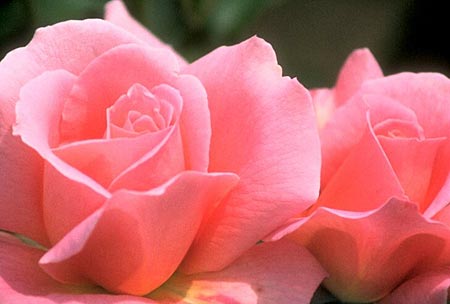
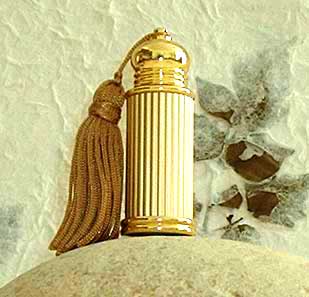

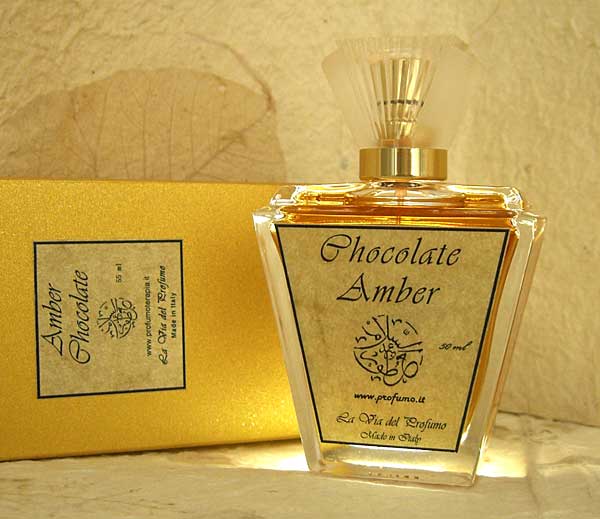
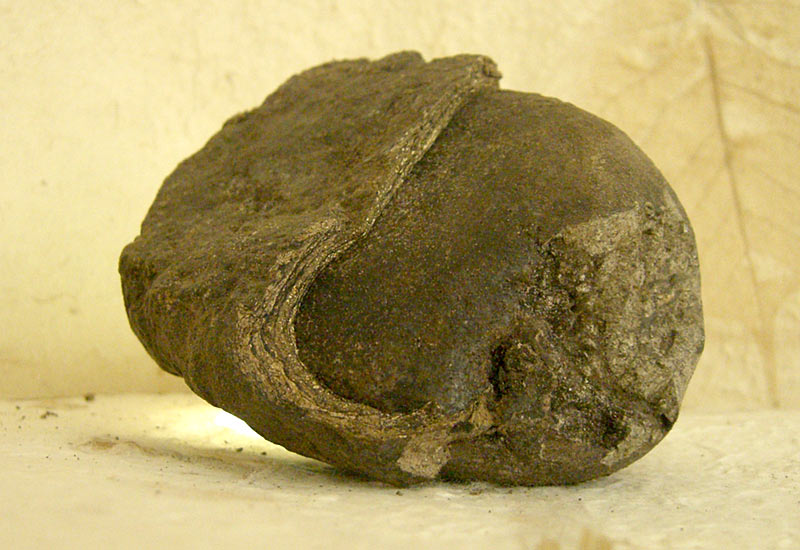
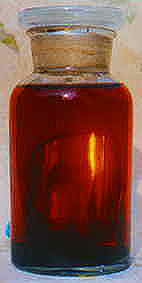
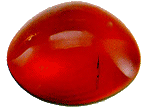
Rose Musk Attar
A blend of Turkish rose essence and absolute with real animal musk Rose essence is one of the most difficult essence to distillate: 6 tons of petals are necessary to obtain just 1 kg of essential oil. Rose 'absolute' is obtained by extraction with the alcohol or with solvents. It is less expensive and its aroma is closer to the aroma of the fresh petals.
Rose is the archetype of flower itself and is the symbol of love, be it profane or divine. Its fragrance gives a sense harmony and security and allows us to overcome our own selfishness and self centeredness. Rose has an affinity with the heart that it livens, allowing it to irradiate the energy of love in our thoughts and our actions. The aroma of Rose harmoniously joins the sacred and the sensuality and helps to spiritualise the sexual relations. It favours the inventiveness in all the fields because it is the preferred fragrance of the angels and 1 inspiration is of angelic nature.
Rose essence is used in psycho-aromatherapy in the cure of mental diseases and in aromatherapy it is a special gift for the women; it prevents the prolepses and the tendency to abortion, calm the spasms and stops the haemorrhages. Rose essential oil has a balancing effect on the hormonal system, useful in menstrual disturbs and during menopause and is a wonderful support, psychologically as well as physically during pregnancy.
Link to Rose Perfumes
Sniffapalooza Magazine Interview
with Perfumer
Dominique Dubrana
Abdes Salam Attar
La Via del Profumo
By Raphaella Barkley
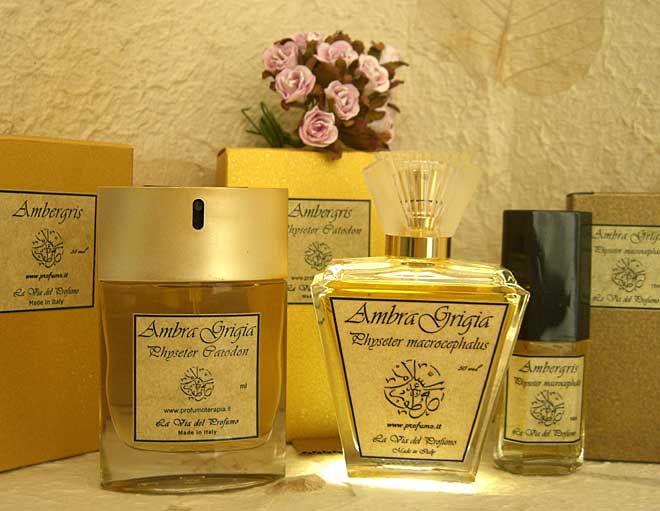

Tincture of Ambergris
Raw Ambergris
Amber
La Via del Profumo offers perfumery courses, offers various hard to find products and natural perfumes, buys and sells ambergris and has many articles, a blog and public forum for perfumers and students. Links are included at the bottom of interview and well as links to reviews.
Luca Turin
Perfumes
The Guides
Luca (Profumo.it) anything anything $$$$
On my table there sits a bottle of a very nice fragrance with my name on it. It was composed by Dominique Dubrana of Profumo.
It by a clever system you will find on his website. You choose the materials you want in the mix (and the price reflects which ones you picked), give him a few more indications and he composes a fragrance for you. It is ideal for people who want a bespoke fragrance but do not have $100K handy. LT
I have a trio named Tania, all interesting variations on the resinous floral theme I gave Dubrana, an all-naturals perfumer who possesses an unmatched gut instinct for where to seek beauty in this exceptionally difficult subset of the art. TS
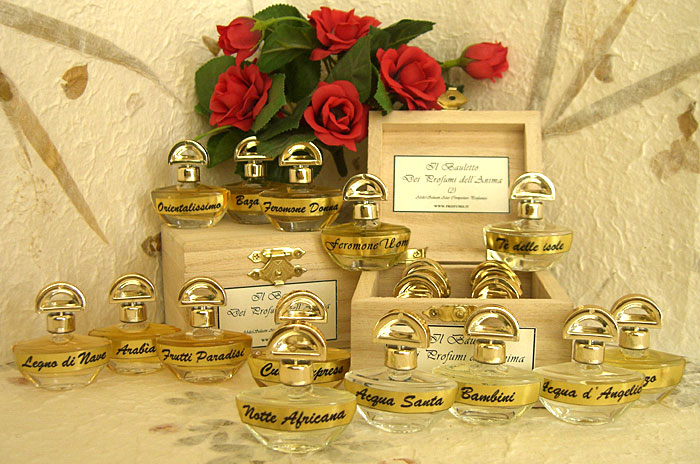
All rights reserved 2006-2009. All content belongs to Sniffapalooza Magazine.
All articles by individual writers and contributors, understand and agree that each article that is accepted by the Editor for publication; becomes the property of Sniffapalooza Magazine for the sole purpose of publication for Sniffapalooza Magazine. Articles may be archived for permanent use on the web site for Sniffapalooza Magazine and for future issues. All articles remain the property of Sniffapalooza Magazine for display purposes only.